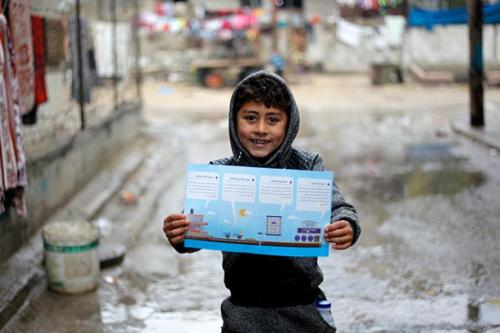Nearly 25 per cent of boys aged 15 out of school in the State of Palestine
Adolescent boys out of school due to the low quality of education, lack of relevance to their young lives, physical and emotional violence in schools, and conflict
Almost all Palestinian children, between the ages of six and nine, are in school, but by age 15, nearly 25 per cent of boys and 7 per cent of girls have dropped out, according to the ‘State of Palestine: Country Report on Out-of-School Children’.

The report, from UNICEF in the State of Palestine and the UNESCO Institute of Statistics, in cooperation with the Ministry of Education and Higher Education (MoEHE), highlights the multiple and often inter-related factors behind why children are out of school.
Adolescent boys, aged 14 and 15, make up nearly half of all children, up to the compulsory school age of 15, who are out of school. The report notes that more boys in this age group are missing out on education in the West Bank (18.3 per cent), compared to the Gaza Strip (14.7 per cent)*.
The main reasons for drop out include low quality education, that is also often seen as not relevant to their lives, physical and emotional violence in schools, including from teachers and peers, and armed conflict.
“Reaching children who are most at risk of dropping out of school, such as adolescent boys, and tackling the issues they face before it’s too late, is critical to keep them in class,” said Genevieve Boutin, UNICEF’s Special Representative in the State of Palestine. “Creating jobs for young graduates is also a priority, notably in the Gaza Strip where more than 60 per cent of young people are unemployed.”
The report highlights how better tailored education and support services, to meet the needs of individual students, particularly for those who fall behind, can help reduce drop out. This includes, flexible curriculum, different types of remedial learning opportunities and counselling services in schools.
“Access to quality education in a safe school environment will ultimately help all children to stay in school and develop the knowledge and skills needed to progress in life,” said Boutin.
Getting to school can also be a distinct challenge for adolescent boys in the State of Palestine. In the West Bank, children are often forced to pass through several checkpoints, roadblocks and to go around Israeli settlements just to reach class. This can be especially difficult for adolescent boys, as they are more likely to be stopped and questioned on the way to school.
In the Gaza Strip, classes are overcrowded with an average of 37 children per class. Among those enrolled in Grades 1 to 10, some 90 per cent go to double-shift schools. This reduces learning hours and the ability for teachers to properly support children, especially those who have learning and behavioral difficulties.
“Children who fall behind in class are more likely to drop out and therefore are more at risk of abuse and exploitation out of school,” said Boutin. “Being in school not only helps Palestinian children to learn and develop but also provides stability and life-skills that are particularly important in such a high-stress environment,” Boutin added.
The report also notes that violence affects education in many ways. More than two-thirds of children in Grades 1 to 10 report being exposed to emotional and physical violence in their schools, and – due to the conflict - more than 29,000 children in 2017 had their schooling interrupted in 170 attacks and threats of attacks on schools, students or teachers that further affects school attendance.
To fulfil the right to education for every child in the State of Palestine, UNICEF is calling for:
• Improving quality of education at low performing schools.
• Increasing access to tailored education services, in and out of school, including year-round remedial education programmes.
• Improving training and technical support to teachers for inclusive education.
• Targeting and tailoring in-school and other support services, such as counselling, social assistance programmes and health services.
• Improving and scaling up violence prevention programmes in schools, including positive discipline training for teachers.
• Protecting schools from conflict related violence, including incursions by security and military forces.
Source:United Nations Childrens's Fund
- 587 reads
Human Rights
Fostering a More Humane World: The 28th Eurasian Economic Summi

Conscience, Hope, and Action: Keys to Global Peace and Sustainability

Ringing FOWPAL’s Peace Bell for the World:Nobel Peace Prize Laureates’ Visions and Actions

Protecting the World’s Cultural Diversity for a Sustainable Future

Puppet Show I International Friendship Day 2020

